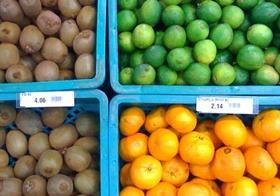
Consumers in Europe need to put fresh produce prices in perspective and realise that, compared with other food products, the cost of purchasing fruit and vegetables is significantly lower.
That's the main message of a new investigation by European fresh produce association Freshfel Europe, the results of which have just been published.
The study found that, with consumers spending a limited amount of their total and food expenditure on fresh fruit and vegetables, price remains among the top purchase criteria.
However, market observations collated by Freshfel apparently show that fruit and vegetables are not expensive, or indeed becoming more expensive over time, in comparison with other food products, but rather are perceived to have a high price.
The price debate, it said, must be seen in the context of other food items and the various values and benefits which purchasing fresh fruit and vegetables can offer the general public.
Reports on living costs published by various European country institutions – including the UK Office for National Statistics, the French Institut National de la Statistique et des études économiques and Spain's Ministerio de Medio Ambiente y Medio Rural y Marino – show that, of the average weekly household expenditure, an average of around 15 per cent was spent on food and non-alcoholic drinks.
In individual members states, that figure varied: in the UK it was 11.5 oer cent, in Germany 12-15 per cent, in Spain 14.4 per cent and in France 19.8 per cent.
However, the average proportion of total weekly expenditure spent on fresh fruit and vegetables across the EU was only around 1.5 per cent (France 1.37 per cent, UK 1.5 per cent, Spain 2.3 per cent).
Luc Clerx, chairman of Freshfel’s Promotion, Communication and Image Committee, commented: 'Fruit and vegetables account for just around 1.5 per cent of total household and 15 per cent of food expenditure. This clearly demonstrates that fresh produce is not at all a category which should be in the spotlight if shoppers look out for saving their money.'
He added: 'They offer on the contrary a lot of benefits in someone’s daily diet with regard to nutrition and health, the environment, sustainability, etc. and should be valued in this perspective.'
Price observations at European level conducted by Eurostat over the ten years from 1996 until 2006 showed that, on average, the relative prices of fruit and vegetables within the EU declined by 3.3 per cent and 1.6 per cent when compared with price increases on all items.
Differences were also observed between member states, with above-average price increases in some countries and sharp decreases in others.
Defying inflation
Ramon Rey, president of Freshfel Europe, stated: 'It is obvious that due to various circumstances – for example the supply situation, market conditions and mechanisms – prices within the EU are not evolving with the same patterns everywhere.
'However, looking on all food items over a couple of years, market observations show that prices are all in all rather stable, with certain fruit and vegetables being even sold at the same price for the last couple of years, despite inflation.
'The price debate around fruit and vegetables is simply irrelevant if it is put in perspective.'
In overall terms, 1kg of fruit and vegetables could cost between €1-2, whereas prices could be around €9-10 for meat and €11-12 for fish.
Depending on the fruit and vegetable category, eating the recommended 5-a-day (around 600g) could therefore cost between €0.50 and €2.00 per day.
Mr Clerx summarised: 'If you can get several pineapples for the price of a pack of cigarettes or at least two apples for the price of a chocolate snack, it is up to everyone to decide whether price should be a reason not to choose fruit and vegetables.
'The statistics prove that it is a wrong debate to argue that the consumption of fresh fruit and vegetables is hindered by their expensive price and their status in household expenditure.
'Fresh fruit and vegetables are one of the cheapest and also healthiest food categories, which fit perfectly into breakfast, lunch, dinner or as a snack. Given their health and environmental assets, the economics behind their price and consumer budgets, shoppers should in any case consider including more fresh fruit and vegetables into their diets.'



